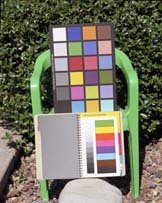I finally understand your point. Of course not, but you have to define it.
I'm glad that you do.
But then, you would understand that you do not have to "define" an observation.
You make sense of it. Try to understand it by constructing an underlying theory that links it to things that we already (think we) understand.
What else is science but an explanation of the natural world? "Sun is bright" isn't as descriptive as 12000 footcandles at sea level.
And both are observations, that do not require, nor are the result of mathematical considerations.
But let's not forget photography isn't only about the physical world.[...]
Now that
is a matter of definition!

But i do agree.
One's overly complicated is another's precise.
Trying to calculate an observation is not the same as being precise.
It is believing that mathematics is creative. But "Jones didn't take a dump, and with it produced the sun, the earth, and things that reflect light. [etc.]"
Yes, it is getting complicated, and the question was about gray card basics (basics can also be read as fundamentals). My first response was to say that meters don't see reflectance
That's true. But only meaningful if you first assume that meters
do things, and are not
used.
Meters are used (in this thread at least) to measure reflectance.
And who doesn't know that? So with that distraction about 'seeing' meters put aside, the discussion about, meters, reflectance and grey cards can again proceed.
and that if you meter a gray card for exterior scenes, you should open up 1/2 stop. That answered the original poster's question. [...]
Indeed.
It also contains an observation, being that meters are not calibrated to middle grey.
Is that a correct observation? Or rather a believe arrived at by doing maths?

How about the reference I made to the Delta-X criterion and that film's really only have one speed? What a claim and with little explanation and it didn't even illicit a peep. Was it because it was sufficient enough to have changed the way everyone perceive the concept of speed or was too insufficient an explanation for anyone to form an opinion about or an argument against?
Or was it as inconsequential as the observation that meters do not see reflectance? A distraction without any bearing on the subject in hand, understood as such?
[...] What most people know about the K-factor comes from Ansel Adams' book, and what he had to say about it was basically conspiratorial gibberish. [...] Shouldn't we make an attempt to correct misinformation whenever possible?
I agree. And yes.
But should we be the ones who first provide that misinformation, so that we can correct it again?

[...] Veiling flare takes off around a stop from the luminance range of the scene (flare adds illuminance to the shadows), thus shifting the mean up. I actually was writing a manuscript on this for PHOTO Techniques, but they though it was too complicated.
How did that great philosopher put it again? "It's deja vu, all over again?"

Or was it because they thought that this phenomenon too was discussed, understood and accounted for extensively already almost 100 years ago?
Oh, and here's an interesting observation. Through the analysis of the camera image, film curve, and paper curve using a four quadrant reproduction curve, I found that while the meter effectively meters 12% reflectance, [...]
Now it is my turn to point out that a meter does not meter a degree of reflectance?





